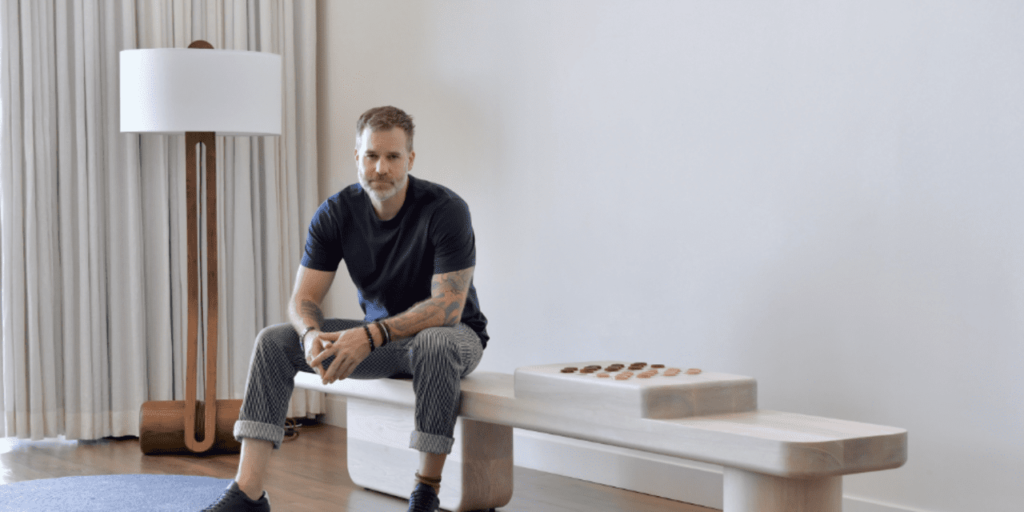A moment of reflection led Todd Hewitt to forge out and launch his own brand after a 27-year career in furniture design working with industry leaders from Henrybuilt to Lawson-Fenning.
“It hit me that this is a last-ditch opportunity for me—now or never,” says Hewitt, who had reached middle age.
Hewitt listened to his gut and Last Ditch Design was born. His Los Angeles-based business was founded in 2022 and specializes in artisan-crafted legacy furniture, with a design sensibility that is a meld of his love of Mid-Century Modern, Scandinavian, and contemporary minimalist aesthetics.
Growing up in small-town, rural Wyoming, Hewitt recalls that his access to art revolved around Western-themed paintings rather than the museums and galleries of a more cosmopolitan existence. He originally studied graphic design, but once he started building furniture, he fell in love with the medium.
“For me, it was a spark that hit and I was like ‘I’m sticking with this,’” he says. With each job, he honed his furniture-making skills, and gained knowledge in the practicalities of running a business from working with vendors to converting the engineering and artistry on the sketch pad to a piece of furniture that is beautiful and able to be used by the consumer.
“They’re built to last,” adds Hewitt, 49. “You can potentially hand these products down to your kids or the next generation.”
Informing his business is a commitment to sustainable production, an ethos Hewitt says “has to be in everything we do now.”
THE ITEMS
Hewitt defines himself as a “maker” first.
“I’m trying to build functional, beautiful pieces of furniture first, and maybe it’s artistic second for me, not the other way around,” he says. “If I build a chair, I want you to be able to sit in it; if I build a credenza, I want it to function for your needs. I don’t want it to be just beautiful or editorial. I think a big part of the brand ethos is function first, aesthetic second, and that is based on the nature of who I am and my career as a production guy first.”
The brand’s latest collection offers a wide variety of products, including sculpted seating, beds, tables, storage options, and smaller pieces such as bowls and mirrors.
Hewitt says that he will tailor custom pieces to suit the particular needs of a given space or project.
THE PRICE
Prices vary throughout the collection. Beds range from US$6,175 to US$14,375, a floor lamp currently retails at US$2,825, while tables can go from a US$2,075 side table at the lower end of the spectrum to a Tumbler Coffee Table that can be priced up to US$10,645.
Seating includes the Bebop Pouf that ranges from US$1,275 to US$2,325 up to the Nostrum Bench, with prices in the range of US$10,000.
Smaller accessories like the Posh Pin are priced at US$350, while the Gannett Bowl ranges from US$1,425 to US$1,550.
WHAT’S THE GOOD?
Last Ditch Design only uses lumber certified by the Forest Stewardship Council, an international nonprofit Hewitt says we all have to be cognizant of how we are impacting the planet.
“I don’t think we are doing our part, how we are living in the now is not ideal for the next generations to come, so we have to be mindful of what we are handing down to them,” he says.
This lumber Hewitt uses is harvested sustainably, and he says it is crucial that the wood he uses isn’t contributing to deforestation and doesn’t impact the greater biodiversity of the area from which it’s being harvested. He’s also committed to producing furniture made with the lowest waste contribution in mind.
Last Ditch Design also partners with One Tree Planted—each order the company receives leads to the planting of 25 new trees. Each planting is made in the customer’s name and is placed in their chosen location.
“Obviously, in what I do, wood is a major component. We have to be mindful of how we are using the material and how it is impacting the globe. From the onset, I wanted to be able to do something where I could give back, with the support of my clients, in a meaningful way,” he explains.
WHAT’S NEXT
In the next five years, Hewitt says he would love to build the business. He is thinking about what kind of collaborations and partnerships he could forge with larger brands and “help them think about the sustainability of their products and get products built around those messages.”
He’s also thinking about the legacy he and his brand will leave on this art form and industry. He fears the future of handicraft and furniture-making looks uncertain.
“I see so many furniture makers who are my age or older. There’s also a diversity gap in terms of gender and race that I see. I would love to be able to make an impact in any capacity to find ways to develop scholarships or something to bring people who wouldn’t have those opportunities to learn and build a skillset and find something they are passionate about,” he says.
Hewitt sees great value in “building with your hands.” He worries that the rise of artificial intelligence and further automation might take away from the artistry behind this kind of design. He hopes to protect this craft.
Read the full article here

